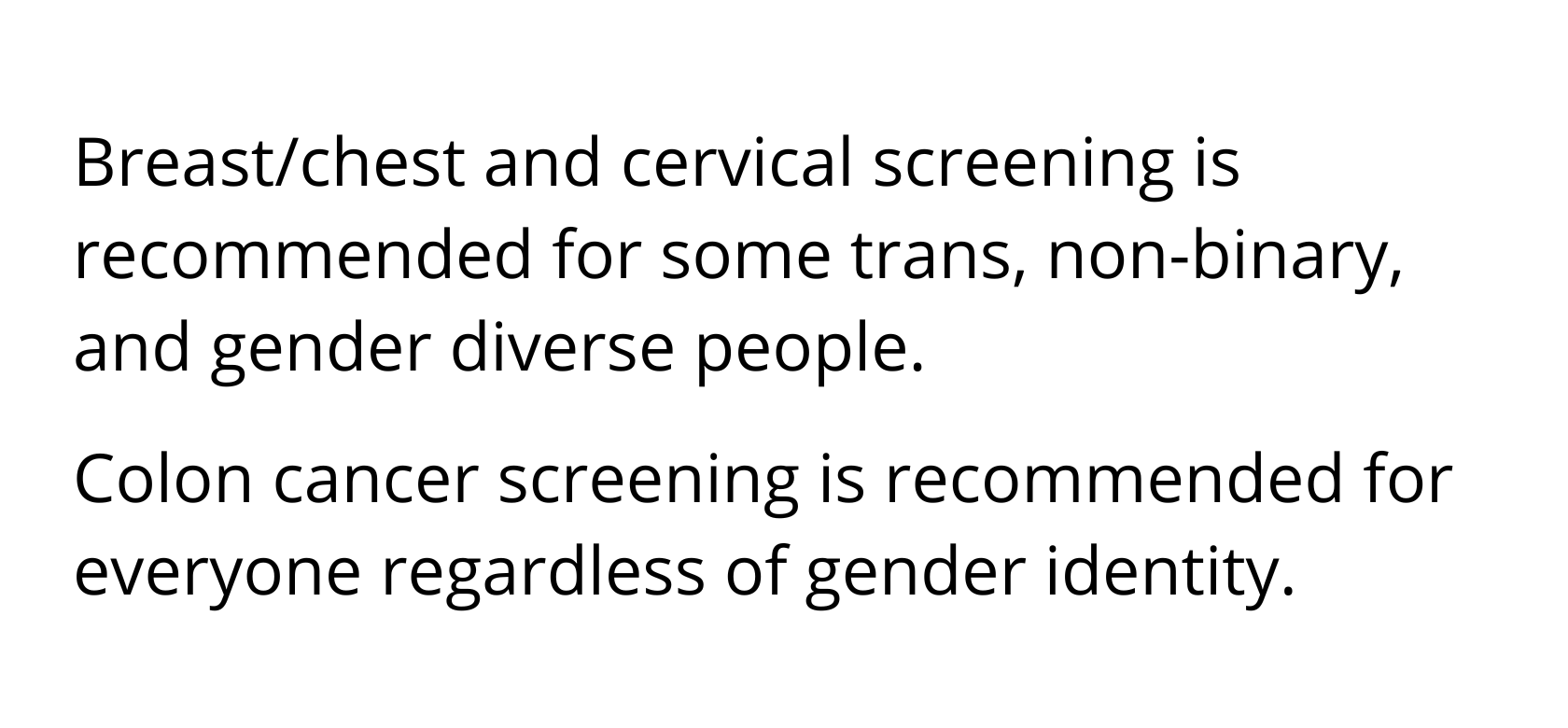Cancer Screening Recommendations for Trans, Non-Binary, and Gender Diverse People
EN | FR


Below is a summary of the cancer screening guidelines for trans, non-binary, and gender diverse people of average risk. If you feel you are at an increased risk for breast/chest, cervical, or colon cancer, speak with your healthcare provider.
Cancer Screening Recommendations
Breast/Chest Cancer Screening
Routine breast/chest cancer screening is every 2 years for most people.
Trans women, non-binary, and gender diverse people age 50-69:
- who have taken gender-affirming hormones for 5 or more years.
Recommendation: Routine screening mammograms at a BreastCheck site (no doctor's referral required) or a diagnostic imaging site (doctor's referral required).
- who have taken gender-affirming hormones for 5 or more years and have breast implants.
Recommendation: Routine screening mammograms at a diagnostic imaging site (doctor's referral required).
- who have not taken gender-affirming hormones or have taken gender-affirming hormones for less than 5 years.
Recommendation: Routine screening mammograms are not recommended.
Trans men, non-binary, and gender diverse people age 50-69:
- who still have breast tissue (have not had top surgery).
Recommendation: Routine screening mammograms at a BreastCheck site (no referral needed) or a diagnostic imaging site (doctor's referral required).
- who no longer have breast tissue (have had top surgery).
Recommendation: Individualized assessment is required at a diagnostic imaging centre (doctor's referral required).
Trans women, men, non-binary, and gender diverse people age 70-74:
- There is no evidence to recommend for or against screening in this population. Guidelines similar to those used for trans, non-binary, and gender diverse people age 50-69 would likely apply.
BreastCheck Access
- Those eligible for screening at a BreastCheck site can call BreastCheck at 1-855-95-CHECK (1-855-952-4325) to make a screening mammogram appointment.
Cervical Cancer Screening
Recommendations for people who have a cervix or neo-cervix age 21-69, and have ever had sexual contact. Sexual contact refers to:
-
oral, genital, or anal skin-to-skin contact, or
-
sex with shared sex toys.
Routine cervical cancer screening is every 3 years for most people.
Trans women, non-binary, and gender diverse people:
- who have had bottom surgery (vaginoplasty) with the creation of a neo-cervix.
Recommendation: Routine cervical cancer screening is recommended.
- who have had bottom surgery (vaginoplasty) without the creation of a neo-cervix.
Recommendation: Cervical cancer screening is not recommended.
- who have not had bottom surgery (vaginoplasty).
Recommendation: Routine cervical cancer screening is not recommend.
Trans men, non-binary, and gender diverse people:
- who have not had their cervix removed.
Recommendation: routine cervical cancer screening with a Pap test.
- who have had their cervix removed and have a history of high-grade dysplasia or cervical cancer.
Recommendation: Routine cervical cancer screening with a vault test.
- who have had their cervix removed and do not have a history of high-grade dysplasia or cervical cancer.
Recommendation: Cervical cancer screening is not recommended.
CervixCheck Access
- Those eligible to participate in cervical cancer screening should make an appointment with their primary care provider or visit the CervixCheck website to find a cervical cancer screening clinic.
Colon Cancer Screening
Most people age 50-74 at average risk of colon or rectal cancer, regardless of their gender identity, should do a colon cancer screening test every 2 years.
ColonCheck Access
Those eligible to participate in colorectal cancer screening can request a kit at ColonCheck.
Resources
- Trans Health Matters CervixCheck bookmark (pdf)
- HPV Vaccine
- Eligibility criteria for HPV vaccination (Manitoba Health)

